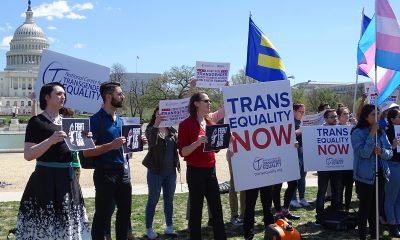National
HISTORIC: EEOC ruling protects trans workers from discrimination
Agency interprets Title VII to protect workers against gender identity discrimination
In a historic ruling, the U.S. Equal Employment Opportunity Commission has determined that job bias against employees on the basis of gender identity amounts to sex discrimination under existing law.
The determination came about as part of the resolution of a case filed by the Transgender Law Center on behalf of Mia Macy, a transgender woman who allegedly was denied a job as a ballistics technician at the federal Bureau of Alcohol, Tobacco, Firearms and Explosives’s laboratory in Walnut Creek, Calif., after she announced she was transitioning from male to female. The decision, made unanimously by the commission on a 5-0 vote, was made public Monday evening.
“[W]e conclude that intentional discrimination against a transgender individual because the person is transgender is, by definition, discrimination ‘based on … sex,’ and such discrimination therefore violates Title VII,” the decision states.
EEOC is the federal agency that interprets and enforces federal non-discrimination laws. Its decision on transgender workers applies to both public and private employers throughout the United States, including in the 34 states where non-discrimination laws based on gender identity don’t exist.
Title VII of the Civil Rights Act of 1964 prohibits employment discrimination based on race, color, religion, sex and national origin. Various courts have determined that transgender workers are protected against discrimination on the basis of this statute, but the decision on Monday marks the first time the EEOC has decided the law protects transgender workers.
Masen Davis, executive director of the Transgender Law Center, said the significance of the decision is “hard to overstate.”
“Transgender people already face tremendous rates of discrimination and unemployment,” Davis said. “The decision today ensures that every transgender person in the United States will have legal recourse to employment discrimination, and with it a way to safeguard their access to vital employment benefits such as health insurance and retirement savings plans.”
EEOC made the decision after the Obama administration was criticized by many in the LGBT community for deciding at this time against issuing an executive order requiring federal contractors to have non-discrimination policies based on sexual orientation and gender identity. The EEOC decision could provide a path to provide transgender workers seeking a remedy against discrimination in lieu of the executive order.
While still presenting as male, Macy, a veteran and former police detective, was told in January 2011 she would receive a position she wanted at the Walnut Creek crime laboratory. As evidence of her impeding hire, Aspen of DC, the contractor responsible for filling the position, contacted her to begin the necessary paperwork and said an investigator was performing a background check.
But after informing the contractor in March 2011 that she would transition from male to female, Macy received an email from the contractor stating that the position, due to federal budget constraints, had been cut. Later, she was told someone else was awarded the position.
Believing she had faced job discrimination, Macy on June 13 filed a formal complaint with the EO for the agency, noting “gender identity” and “sex stereotyping” as the basis of her complaint. After some back-and-forth between Macy and the agency over whether she could seek relief under Title VII, Macy appealed the case in December to EEOC, which determined the law offers her protection as well as protection to other transgender workers.
In a statement, Macy thanked the Transgender Law Center for its support and said she was “proud” to be part of the groundbreaking decision.
“Although the discrimination I experienced was painful both personally and financially, and led to the loss of my family’s home to foreclosure, I’m proud to be a part of this groundbreaking decision confirming that our nation’s employment discrimination laws protect all Americans, including transgender people,” Macy said. “I’m grateful for the help of Transgender Law Center, which believed in me from the start and helped guide me through this process. No one should be denied a job just for being who they are.”
Still, the case isn’t yet over for Macy. The case has been remanded to ATF for further processing in light of the decision. If Macy requests a final decision without a hearing, the agency must render a decision within 60 days of receipt of her request.
EEOC draws on previous decisions that courts have made on whether Title VII provides protections to workers who face discrimination on the basis of gender identity.
Among them is the 11th Circuit Court of Appeals’ ruling in Glenn v. Brumby, in which plaintiff Vandy Beth Glenn, a transgender woman who was fired from her position as proofreader from the Georgia General Assembly in 2007 filed a lawsuit after she announced she would transition from male to female. The court ruled that an individual “cannot be punished because of his or her perceived gender-nonconformity” and these protections must be afforded to transgender people.
Mara Keisling, executive director of the National Center for Transgender Equality, called the decision a “major victory” and said it would further the case of the Employment Non-Discrimination Act, legislation that would bar companies from discrimination against LGBT employees, and the sought-after executive order for federal contractors.
“As many as 90 percent of trans people still face tremendous discrimination in employment according to our National Discrimination Survey, and it will help so much that the EEOC agrees with what more and more courts have been saying — discriminating against trans people because of their sex, or their perceived sex, or what an employer thinks about their sex is clearly sex discrimination, illegal and wrong,” Keisling said.
Tico Almeida, president of Freedom to Work, said the decision expands upon Executive Order 11246, the existing directive prohibiting federal contractors from discriminating on the basis of gender.
“We call on Labor Secretary Hilda Solis and her staff to issue new guidance for federal contractors to inform them that they cannot discriminate against transgender Americans while profiting from taxpayer-funded contracts,” Almeida said.
However, Almeida said Solis won’t have the authority to expand these protections to gay and lesbian Americans working for federal contractors until Obama “corrects the mistake announced by White House staff a few weeks ago” and issues an executive order for all LGBT workers at these companies.
The White House
Four states to ignore new Title IX rules protecting transgender students
Biden administration last Friday released final regulations

BY ERIN REED | Last Friday, the Biden administration released its final Title IX rules, which include protections for LGBTQ students by clarifying that Title IX forbids discrimination based on sexual orientation and gender identity.
The rule change could have a significant impact as it would supersede bathroom bans and other discriminatory policies that have become increasingly common in Republican states within the U.S.
As of Thursday morning, however, officials in at least four states — Oklahoma, Louisiana, Florida, and South Carolina — have directed schools to ignore the regulations, potentially setting up a federal showdown that may ultimately end up in a protracted court battle in the lead-up to the 2024 elections.
Louisiana State Superintendent of Education Cade Brumley was the first to respond, decrying the fact that the new Title IX regulations could block teachers and other students from exercising what has been dubbed by some a “right to bully” transgender students by using their old names and pronouns intentionally.
Asserting that Title IX law does not protect trans and queer students, Brumley states that schools “should not alter policies or procedures at this time.” Critically, several courts have ruled that trans and queer students are protected by Title IX, including the 4th U.S. Circuit Court of Appeals in a recent case in West Virginia.
In South Carolina, Schools Supt. Ellen Weaver wrote in a letter that providing protections for trans and LGBTQ students under Title IX “would rescind 50 years of progress and equality of opportunity by putting girls and women at a disadvantage in the educational arena,” apparently leaving trans kids out of her definition of those who deserve progress and equality of opportunity.
She then directed schools to ignore the new directive while waiting for court challenges. While South Carolina does not have a bathroom ban or statewide “Don’t Say Gay or Trans” law, such bills continue to be proposed in the state.
Responding to the South Carolina letter, Chase Glenn of Alliance For Full Acceptance stated, “While Supt. Weaver may not personally support the rights of LGBTQ+ students, she has the responsibility as the top school leader in our state to ensure that all students have equal rights and protections, and a safe place to learn and be themselves. The flagrant disregard shown for the Title IX rule tells me that our superintendent unfortunately does not have the best interests of all students in mind.”
Florida Education Commissioner Manny Diaz also joined in instructing schools not to implement Title IX regulations. In a letter issued to area schools, Diaz stated that the new Title IX regulations were tantamount to “gaslighting the country into believing that biological sex no longer has any meaning.”
Governor Ron DeSantis approved of the letter and stated that Florida “will not comply.” Florida has notably been the site of some of the most viciously anti-queer and anti-trans legislation in recent history, including a “Don’t Say Gay or Trans” law that was used to force a trans female teacher to go by “Mr.”
State Education Supt. Ryan Walters of Oklahoma was the latest to echo similar sentiments. Walters has recently appointed the right-wing media figure Chaya Raichik of Libs of TikTok to an advisory role “to improve school safety,” and notably, Raichik has posed proudly with papers accusing her of instigating bomb threats with her incendiary posts about LGBTQ people in classrooms.
The Title IX policies have been universally applauded by large LGBTQ rights organizations in the U.S. Lambda Legal, a key figure in fighting anti-LGBTQ legislation nationwide, said that the regulations “clearly cover LGBTQ+ students, as well as survivors and pregnant and parenting students across race and gender identity.” The Human Rights Campaign also praised the rule, stating, “rule will be life-changing for so many LGBTQ+ youth and help ensure LGBTQ+ students can receive the same educational experience as their peers: Going to dances, safely using the restroom, and writing stories that tell the truth about their own lives.”
The rule is slated to go into effect Aug. 1, pending any legal challenges.
****************************************************************************

Erin Reed is a transgender woman (she/her pronouns) and researcher who tracks anti-LGBTQ+ legislation around the world and helps people become better advocates for their queer family, friends, colleagues, and community. Reed also is a social media consultant and public speaker.
******************************************************************************************
The preceding article was first published at Erin In The Morning and is republished with permission.
Pennsylvania
Malcolm Kenyatta could become the first LGBTQ statewide elected official in Pa.
State lawmaker a prominent Biden-Harris 2024 reelection campaign surrogate

Following his win in the Democratic primary contest on Wednesday, Pennsylvania state Rep. Malcolm Kenyatta, who is running for auditor general, is positioned to potentially become the first openly LGBTQ elected official serving the commonwealth.
In a statement celebrating his victory, LGBTQ+ Victory Fund President Annise Parker said, “Pennsylvanians trust Malcolm Kenyatta to be their watchdog as auditor general because that’s exactly what he’s been as a legislator.”
“LGBTQ+ Victory Fund is all in for Malcolm, because we know he has the experience to win this race and carry on his fight for students, seniors and workers as Pennsylvania’s auditor general,” she said.
Parker added, “LGBTQ+ Americans are severely underrepresented in public office and the numbers are even worse for Black LGBTQ+ representation. I look forward to doing everything I can to mobilize LGBTQ+ Pennsylvanians and our allies to get out and vote for Malcolm this November so we can make history.”
In April 2023, Kenyatta was appointed by the White House to serve as director of the Presidential Advisory Commission on Advancing Educational Equity, Excellence and Economic Opportunity for Black Americans.
He has been an active surrogate in the Biden-Harris 2024 reelection campaign.
The White House
White House debuts action plan targeting pollutants in drinking water
Same-sex couples face higher risk from environmental hazards

Headlining an Earth Day event in Northern Virginia’s Prince William Forest on Monday, President Joe Biden announced the disbursement of $7 billion in new grants for solar projects and warned of his Republican opponent’s plans to roll back the progress his administration has made toward addressing the harms of climate change.
The administration has led more than 500 programs geared toward communities most impacted by health and safety hazards like pollution and extreme weather events.
In a statement to the Washington Blade on Wednesday, Brenda Mallory, chair of the White House Council on Environmental Quality, said, “President Biden is leading the most ambitious climate, conservation, and environmental justice agenda in history — and that means working toward a future where all people can breathe clean air, drink clean water, and live in a healthy community.”
“This Earth Week, the Biden-Harris Administration announced $7 billion in solar energy projects for over 900,000 households in disadvantaged communities while creating hundreds of thousands of clean energy jobs, which are being made more accessible by the American Climate Corps,” she said. “President Biden is delivering on his promise to help protect all communities from the impacts of climate change — including the LGBTQI+ community — and that we leave no community behind as we build an equitable and inclusive clean energy economy for all.”
Recent milestones in the administration’s climate policies include the U.S. Environmental Protection Agency’s issuance on April 10 of legally enforceable standard for detecting and treating drinking water contaminated with polyfluoroalkyl substances.
“This rule sets health safeguards and will require public water systems to monitor and reduce the levels of PFAS in our nation’s drinking water, and notify the public of any exceedances of those levels,” according to a White House fact sheet. “The rule sets drinking water limits for five individual PFAS, including the most frequently found PFOA and PFOS.”
The move is expected to protect 100 million Americans from exposure to the “forever chemicals,” which have been linked to severe health problems including cancers, liver and heart damage, and developmental impacts in children.
An interactive dashboard from the United States Geological Survey shows the concentrations of polyfluoroalkyl substances in tapwater are highest in urban areas with dense populations, including cities like New York and Los Angeles.
During Biden’s tenure, the federal government has launched more than 500 programs that are geared toward investing in the communities most impacted by climate change, whether the harms may arise from chemical pollutants, extreme weather events, or other causes.
New research by the Williams Institute at the UCLA School of Law found that because LGBTQ Americans are likelier to live in coastal areas and densely populated cities, households with same-sex couples are likelier to experience the adverse effects of climate change.
The report notes that previous research, including a study that used “national Census data on same-sex households by census tract combined with data on hazardous air pollutants (HAPs) from the National Air Toxics Assessment” to model “the relationship between same-sex households and risk of cancer and respiratory illness” found “that higher prevalence of same-sex households is associated with higher risks for these diseases.”
“Climate change action plans at federal, state, and local levels, including disaster preparedness, response, and recovery plans, must be inclusive and address the specific needs and vulnerabilities facing LGBT people,” the Williams Institute wrote.
With respect to polyfluoroalkyl substances, the EPA’s adoption of new standards follows other federal actions undertaken during the Biden-Harris administration to protect firefighters and healthcare workers, test for and clean up pollution, and phase out or reduce use of the chemicals in fire suppressants, food packaging, and federal procurement.
-

 State Department4 days ago
State Department4 days agoState Department releases annual human rights report
-

 District of Columbia2 days ago
District of Columbia2 days agoCatching up with the asexuals and aromantics of D.C.
-

 South America2 days ago
South America2 days agoArgentina government dismisses transgender public sector employees
-

 Politics5 days ago
Politics5 days agoSmithsonian staff concerned about future of LGBTQ programming amid GOP scrutiny












